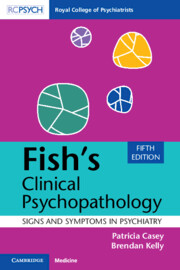Book contents
- Fish’s Clinical Psychopathology
- Fish’s Clinical Psychopathology
- Copyright page
- Contents
- Preface
- 1 Classification of Psychiatric Disorders
- 2 What Is Psychopathology?
- 3 Disorders of Perception
- 4 Disorders of Thought and Speech
- 5 Disorders of Memory
- 6 Disorders of Emotion
- 7 Disorders of the Experience of Self
- 8 Motor Disorders
- 9 Disorders of Consciousness
- 10 Personality Disorders
- Book part
- Index
- References
9 - Disorders of Consciousness
Published online by Cambridge University Press: 12 January 2024
- Fish’s Clinical Psychopathology
- Fish’s Clinical Psychopathology
- Copyright page
- Contents
- Preface
- 1 Classification of Psychiatric Disorders
- 2 What Is Psychopathology?
- 3 Disorders of Perception
- 4 Disorders of Thought and Speech
- 5 Disorders of Memory
- 6 Disorders of Emotion
- 7 Disorders of the Experience of Self
- 8 Motor Disorders
- 9 Disorders of Consciousness
- 10 Personality Disorders
- Book part
- Index
- References
Summary
Recent decades have seen a considerable renaissance of scienti?c interest in the study of human consciousness. For the purposes of descriptive clinical psychopathology, consciousness can be simply de?ned as a state of awareness of the self and the environment. Disorders of consciousness are associated with disorders of perception, attention, attitudes, thinking, registration, and orientation. Consciousness can be changed in three basic ways: it may be dream-like, depressed, or restricted. This chapter outlines these different types of disturbance of consciousness, including delirium, twilight states, and dissociative fugue, among other conditions. The chapter concludes with suggested questions for eliciting specific symptoms in clinical practice, in addition to standard history-taking and mental state examination.
- Type
- Chapter
- Information
- Fish's Clinical PsychopathologySigns and Symptoms in Psychiatry, pp. 103 - 107Publisher: Cambridge University PressPrint publication year: 2024

